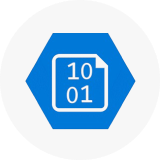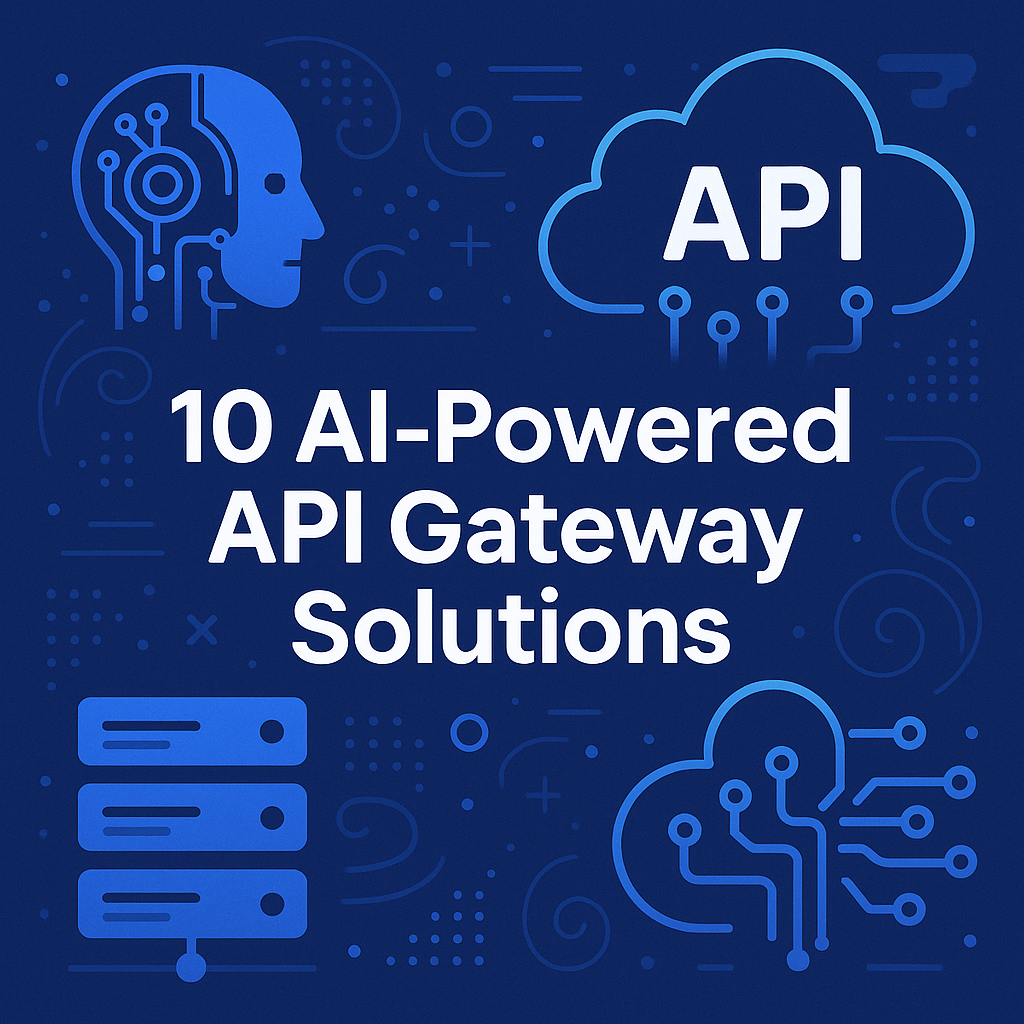APIs are the foundation of modern software ecosystems—connecting applications, services, and databases so information can flow securely and efficiently. But as systems become more complex and businesses demand faster innovation, traditional, manual approaches to API management no longer scale.
That’s where AI-powered API gateways come in. These modern platforms introduce automation, adaptability, and intelligent control to help organizations build, manage, and scale APIs with less friction and more flexibility.
Across industries, companies are looking for ways to automate API integration and generation. These tools reduce repetitive development work, improve security posture, and enable faster time-to-market for new digital services.
But AI gateways go further—they’re reshaping how development teams work.
Let’s look at ten platforms that are driving this transformation.
Comparison Table: Highlights at a Glance
|
Solution |
Automated API Generation |
AI-Powered Integration |
Security & RBAC |
Code-Free Workflow |
Deployment Options |
|---|---|---|---|---|---|
|
DreamFactory |
Yes |
Yes |
Yes |
Yes |
On-prem, Cloud |
|
Kong Gateway |
Partial (with plugins) |
Yes |
Yes |
Yes (with Insomnia) |
On-prem, Cloud, Hybrid |
|
MuleSoft AI-Powered |
Yes |
Yes |
Yes |
Yes |
Cloud, Hybrid |
|
Apigee (Google) |
Partial (APIgen) |
Yes |
Yes |
Yes |
Cloud, Hybrid |
|
AWS API Gateway |
Partial (for AWS) |
Yes (CodeWhisperer) |
Yes |
Yes |
Cloud |
|
Azure API Management |
Partial (APIMatic) |
Emerging |
Yes |
Yes |
Cloud, Hybrid |
|
Tyk Gateway |
Yes (with plugins) |
Yes |
Yes |
Partial |
On-prem, Cloud, Hybrid |
|
RapidAPI Studio |
Yes |
Yes |
Yes |
Yes |
Cloud |
|
WSO2 API Manager |
Yes |
Yes |
Yes |
Partial |
On-prem, Cloud |
|
OpenAI API Gateway |
Yes (with plugins) |
Yes (AI native) |
Yes |
Yes |
Cloud |
This table offers only a high-level overview. Each platform brings a unique set of strengths, features, and approaches to API automation.
DreamFactory: Open Source Automation at Its Finest
DreamFactory excels as the top AI gateway for automated API integration and generation. It serves as both a powerful automation platform and a secure API gateway with the following robust features:supports automatic creation of REST API
- Instant REST API Generation: Seamlessly generate APIs for various backends, such as SQL, NoSQL, file, email, and web services, without any coding
- Automatic Security: Every API endpoint is secured automatically, providing role-based access, OAuth2, SSO, and detailed control settings
- Business Logic Customization: Teams can tailor business logic by incorporating custom scripts in languages like Node.js, Python, or PHP, enhancing the gateway's flexibility
- SOAP/REST Conversion: Easily connect legacy systems using SOAP and transform them into modern REST interfaces, streamlining complex API integrations
- Scalable Deployment Choices: Supports cross-platform deployment (Linux, Windows, Mac) and offers diverse hosting options, whether cloud-based or on-premises.
This adaptability makes it an ideal choice for highly regulated sectors like finance and healthcare—where stringent compliance requirements demand an AI gateway that enables secure, automated API integration, management, and the automatic creation of RESTful APIs.
Kong Gateway: Versatility Meets Intelligence
Kong has long been a heavyweight in the API world. Its open core, paired with a vast library of AI-enabled plugins and integrations, allows organizations to build highly scalable meshes adapted to dynamic needs.
Noteworthy abilities include:
- Scheduled or event-driven API generation via plugins
- AI integration for anomaly detection, policy enforcement, and traffic shaping
- A broad array of authentication and observability options
- Seamless compatibility with legacy services and microservices alike
With Kong Insomnia, API design and testing also gain a boost, helping teams turn ideas into secure, tested endpoints using modern AI assistance.
MuleSoft: Automation for the Enterprise
Businesses seeking deep integration across complex environments look to MuleSoft. Its AI integration capabilities let users map data, and generate APIs almost entirely through an intuitive interface.
Unique aspects include:
- MuleSoft AI Copilot that suggests connections and transformation logic
- Prebuilt connectors for hundreds of popular services and databases
- Real-time monitoring and adaptive throttling based on live API health data
MuleSoft’s unified platform provides both a gateway and a management console, making governance, auditing, and analytics highly accessible for technical and business stakeholders.
Google Apigee: AI at Scale
Apigee is the choice for organizations wanting modular AI integration within their API stack. Through its APIgen feature, Apigee leverages Google’s AI to learn typical usage patterns.
Here’s what stands out:
- AI-assisted API creation, testing, and monitoring
- Dynamic threat detection informed by global API traffic trends
- Built-in monetization features for digital platforms
- Smart API proxies for legacy and cloud-first applications
Apigee’s reputation for reliability and innovation helps tech leaders manage portfolios from dozens to thousands of endpoints—all with continuous intelligence from Google’s infrastructure.
AWS API Gateway: Cloud-Native and AI-First
AWS’s offering ties neatly into its broader AI ecosystem. Direct links with Amazon CodeWhisperer and SageMaker let developers create, secure, and optimize APIs using machine-generated suggestions and automations.
What AWS API Gateway brings:
- One-click deployment for REST and WebSocket APIs
- AI-generated integration code snippets and API models
- Native rate limiting and security using AWS Identity services
- Effortless scaling and global distribution
AWS customers benefit from the platform’s mature monitoring, alerts, and rollback tools, reducing risk as projects scale.
Microsoft Azure API Management: Intelligent Integration
Azure’s API Management takes a distinctly AI-focused route through its partnership with APIMatic and built-in AI tools. The experience is aimed at quick generation of OpenAPI (Swagger) specs and runtime management.
Features to consider:
- API import, transformation, and generation using AI
- Security and access control via Azure Active Directory integration
- Hybrid deployment for on-prem data or compliance needs
AI-driven performance diagnosis and predictive analytics help tech teams stay ahead of scaling or security challenges.
Tyk Gateway: Lightweight, Extensible, Smart
Small teams and agile enterprises looking for powerful automation find Tyk appealing. While not as fully-featured as some, Tyk’s plugin system supports AI-driven annotation, rate limiting, and traffic orchestration.
Advantages include:
- Rapid API generation through templates and plugins
- Built-in machine learning modules for analytics and anomaly detection
- Fine-grained access roles and policies
Tyk’s low footprint ensures it works well even within resource-constrained environments.
RapidAPI Studio: Integrate, Publish, Discover
RapidAPI Studio puts the power of API automation directly in developers’ browsers. Harnessing AI for code suggestion, schema validation, and integration, it’s especially popular for SaaS businesses and growing startups.
Benefits at a glance:
- API auto-generation based on database models and user prompts
- Easy consumption via an extensive API marketplace
- Performance monitoring and instantaneous feedback powered by AI
RapidAPI’s fully managed experience makes onboarding and experimentation frictionless for distributed teams.
WSO2 API Manager: End-to-End Lifecycle Automation
WSO2 offers a mature, open-source management suite that now includes several AI-powered accelerators. It aims for seamless onboarding, security, and analytics wrapped in a highly extensible package.
Key points:
- Automated API creation and policy management
- Integrated machine learning for traffic management and abuse prevention
- Multi-cloud deployment capabilities
The platform’s substantial plugin ecosystem and deep support for open standards make it a smart choice for organizations already embracing open source tools.
OpenAI API Gateway: AI Native at the Core
With OpenAI stepping into the API gateway space, developers can infuse natural language and code generation into their workflows from the ground up. While still in early adoption outside of pure AI use cases, it brings a glimpse of the future.
Features making an impact already:
- Instant API creation from textual prompts
- Natural language-based policy and transformation rule authoring
- Adaptive fine-tuning for both generation and management
For teams looking to harness the deepest AI capabilities, OpenAI’s gateway sets the stage for intelligent, language-first system connectivity.
Choosing the Right Platform: What to Prioritize
Selecting the best AI-powered API gateway depends on your infrastructure, compliance needs, and future growth. Before committing to a platform, consider the following practical factors:
- Integration Complexity: Does your stack include legacy systems, complex databases, or industry-specific compliance requirements like HIPAA or GDPR?
- Security Requirements: Do you need advanced features like granular RBAC, real-time threat detection, audit logging, or federated identity support (SSO, OAuth2, LDAP)?
- Developer Experience: Will your teams benefit from low-code workflows, real-time code generation, live documentation, or prebuilt connectors?
- Scalability and Lifecycle Management: Can the platform scale with your needs—adding, updating, and deprecating APIs quickly without disrupting service?
- Cost and Deployment Flexibility: Do you need an open-source or on-premise option to avoid vendor lock-in, or is a fully managed SaaS model acceptable?
Platforms like DreamFactory and other next-gen gateways are pushing the boundaries—not just in how fast APIs are generated, but in how securely, intelligently, and governably teams manage integrations at scale.
Each tool in this evolving landscape brings something distinct. Whether it’s automation-first design, AI-enhanced orchestration, or zero-friction deployment, these solutions enable modern API strategies that prioritize speed, security, and adaptability.
Adopting an AI-powered gateway isn’t just a tech upgrade—it’s a strategic shift in how development and business teams collaborate to deliver digital products faster, safer, and smarter.
Terence Bennett, CEO of DreamFactory, has a wealth of experience in government IT systems and Google Cloud. His impressive background includes being a former U.S. Navy Intelligence Officer and a former member of Google's Red Team. Prior to becoming CEO, he served as COO at DreamFactory Software.
























 Blog
Blog
